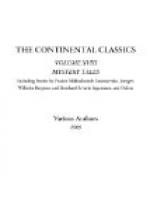“You are in pain, a chair! Pray sit down! Some water!”
Raskolnikoff allowed himself to sink on the chair that was offered him, but he could not take his eyes off Elia Petrovitch, whose face expressed a very unpleasant surprise. For a moment both men looked at one another in silence. Water was brought!
“It was I—” commenced Raskolnikoff.
“Drink.”
With a movement of his hand the young man pushed aside the glass which was offered him; then, in a low-toned but distinct voice he made, with several interruptions, the following statement:—
“It was I who killed, with a hatchet, the old moneylender and her sister, Elizabeth, and robbery was my motive.”
Elia Petrovitch called for assistance. People rushed in from various directions. Raskolnikoff repeated his confession.
FOOTNOTES TO CRIME & PUNISHMENT:
[1]: (At the risk of shocking the reader, it has been decided that the real permanent detective stories of the world were ill represented without Dostoyevsky’s terrible tale of what might be called “self-detection.” If to sensitive readers the story seems so real as to be hideous, it is well to recall that Dostoyevsky in 1849 under-went the agony of sentence to death as a revolutionist. Although the sentence was commuted to hard labor in Siberia, and although six years later he was freed and again took up his writing, his mind never rose from beneath the weight of horror and hopelessness that hangs over offenders against the Great White Czar. Dostoyevsky, sentenced as a criminal, herded with criminals, really became a criminal in literary imagination. Add to this a minute observation, a marvelous memory, ardent political convictions—and we can understand why the story here, with others of his, is taken as a scientific text by criminologists.—EDITOR.)
[2]: 1,000 yards.
[3]: Janitors.
[4]: little father
[5]: Cabbage soup.
ANTON CHEKHOFF
THE SAFETY MATCH
On the morning of October 6, 1885, in the office of the Inspector of Police of the second division of S—— District, there appeared a respectably dressed young man, who announced that his master, Marcus Ivanovitch Klausoff, a retired officer of the Horse Guards, separated from his wife, had been murdered. While making this announcement the young man was white and terribly agitated. His hands trembled and his eyes were full of terror.
“Whom have I the honor of addressing?” asked the inspector.
“Psyekoff, Lieutenant Klausoff’s agent; agriculturist and mechanician!”
The inspector and his deputy, on visiting the scene of the occurrence in company with Psyekoff, found the following: Near the wing in which Klausoff had lived was gathered a dense crowd. The news of the murder had sped swift as lightning through the neighborhood, and the peasantry, thanks to the fact that the day was a holiday, had hurried together from all the neighboring villages. There was much commotion and talk. Here and there, pale, tear-stained faces were seen. The door of Klausoff’s bedroom was found locked. The key was inside.




